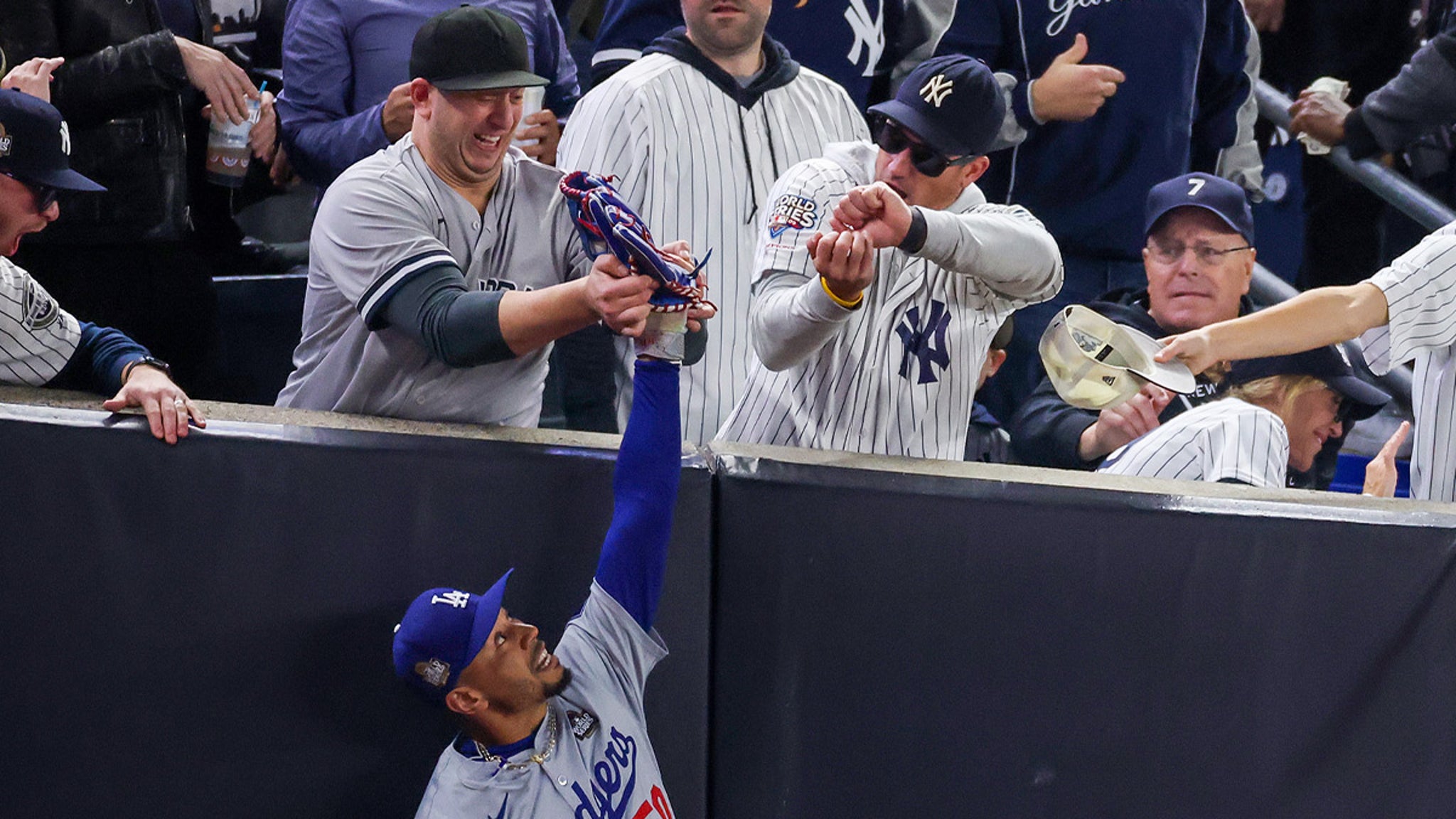Products You May Like
In a captivating scene from Game 4 of the World Series, two New York Yankees fans found themselves at the center of a controversial incident involving star player Mookie Betts. The fans, identified as Austin Capobianco and John Peter, sparked outrage when they attempted to snatch a ball from Betts’ glove while he was making a catch. This audacious act of fan interference led to their immediate ejection from Yankee Stadium, leaving many wondering about the repercussions of their actions.
The Yankees organization did not take this incident lightly and swiftly announced that the two fans would not be allowed to attend Game 5 of the World Series, marking the end of the Yankees’ home games for the season. The team emphasized the importance of safety, stating that the actions displayed during the game were “egregious and unacceptable.” The protection of players and the overall atmosphere of the game must never be compromised, the Yankees insisted, as they called for passionate support from fans without crossing boundaries.
As the situation unfolded, Major League Baseball (MLB) also stepped in, stating that they were collaborating closely with the Yankees to enforce a ban on the two individuals for the remainder of the series. Reports suggested that MLB was even prepared to refund the ticket prices to ensure the fans would not return to the stadium, reinforcing their stance on maintaining a safe and respectful environment for players and spectators alike.
Striking a more heartwarming note, in a display of empathy and community spirit, the Yankees announced that the ejected fans’ tickets would be reassigned to a pediatric cancer patient and his family, allowing them a chance to experience the monumental event. This gesture reflects the team’s commitment to using its platform for positive change and support.
Despite their ban from the upcoming game, Capobianco and Peter had a moment to share their side. They acknowledged their ejection but expressed belief that they would potentially be allowed back in the future, a statement that contrasted sharply with the Yankees and MLB’s firm stance against their behavior. Fans on social media responded to the incident with mixed emotions, debating the line between enthusiasm and recklessness during high-stakes sporting events.
As discussions about fan behavior and player safety continue to circulate, the Yankees are determined to uphold the integrity of the game while fostering an entertaining atmosphere that celebrates the passion of their dedicated supporters. The climax of the World Series serves as a fitting backdrop where sportsmanship, fervor, and respect should reign supreme, showcasing not only the thrill of baseball but also the responsibility that comes with being a fan.
In a world where such incidents can threaten the spirit of sports, the spotlight remains on the balance between fan engagement and ensuring that the game remains a safe space for athletes and spectators alike. As Game 5 approaches, all eyes will be on Yankee Stadium, eager to embrace the electrifying atmosphere while keeping the focus on true sportsmanship.In a dramatic moment during the crucial playoff game against the New York Yankees, Los Angeles Dodgers star Mookie Betts found himself amid a chaotic scene involving two Yankee fans. This incident unfolded in the very first inning when Betts attempted to snag a pop fly hit by Yankees player Gleyber Torres. As he reached into the stands, expecting to catch the ball, the situation took an unexpected turn.
As Betts secured the ball, two fans, identified as Capobianco and Peter, did not sit idly by. Instead, they lunged for Betts, grabbing at his arms in an effort to wrest the ball away from him. This intense interaction quickly escalated, leading to the two fans being escorted away from their seats mere moments after the incident. The scene raised eyebrows and sparked a flurry of discussions among players, fans, and commentators alike, questioning the boundaries of fan behavior at games.
Despite the frenzy surrounding this incident, Betts opted to remain unfazed. Speaking to reporters after the Dodgers suffered an 11-4 defeat, he referred to the altercation as “irrelevant” to the overall outcome of the game. His pragmatism in the face of a chaotic moment highlighted his focus on the game rather than the antics of spectators.
Capobianco, one of the fans involved, later spoke to ESPN, acknowledging that he knew he had crossed a line but also oddly defending his actions, suggesting that he had a duty to “patrol that wall.” His remark reflects a growing tension surrounding stadium etiquette and fan interactions, particularly in high-stakes games where emotions run high.
Betts, well-known for his professionalism on and off the field, seemed to downplay the significance of the couple of seconds that turned into a wrestling match over a baseball. This ability to shrug off the commotion demonstrates his commitment to the game and his understanding of the fan experience. In modern sports, where fans often feel a sense of ownership over the game and its players, incidents like this serve as a reflection of the fine line between excitement and overstepping bounds.
As the playoffs progressed, the narrative of Betts and the fans continued to circulate among sports commentators and casual fans alike, quickly transforming the incident into a minor spectacle. It revealed not only the intensity of playoff baseball but also the nature of fan behavior in the high-stakes environment of professional sports. Being part of such a thrilling event can lead to passionate yet misguided attempts at participation, showcasing the sometimes-unpredictable dynamics at play between athletes and their supporters in the fervor of competitive moments.
Ultimately, while the Dodgers faced a disappointing loss, the incident added an unexpected twist to a critical game, inviting reflections on the experience of attending live sports events. Fan engagement, whether through cheers or controversies, remains an indispensable part of the fabric of the game, continuing to evolve with each new season.
